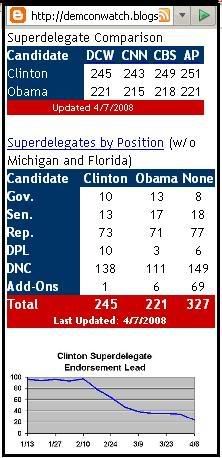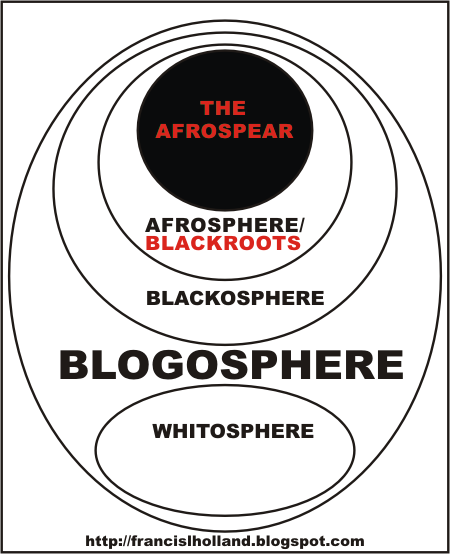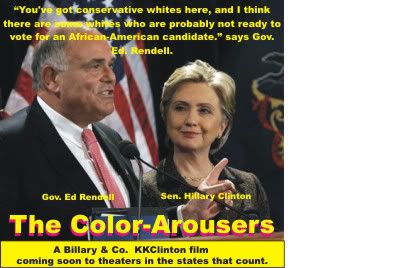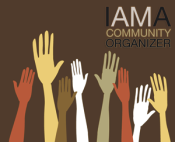
Earlier this year, some blogs as well as Clintons surrogates argued that Barack Obama would have a difficult time winning the presidential race simply because of his skin color. However, the graphic above (full of actual facts) tells a different story. Ten governors of US states are for Clinton, but 13 (30% more) have endorsed Obama. Governors, as we all know, are super-delegates, and so their opinion counts whether they are from caucus states, big states or small states. Of course Clinton and her surrogates will assure us that this fact does not matter, and is not indicative of meaningul support for Obama.
The graphic also shows that while Clinton has the support of 13 US senators, Obama has the support of 17 senators. Obama has five more US senators than Clinton does!
Now, Clinton has the support of 73 members of the US House of Representatives, while Obama has 71, or only two less.
Thus, our historical experience helped conditioned our ideation - what we would believe and refuse to believe, think and exclude from our thinking. In addition, we have all been told, explicitly or implicitly, throughout our childhoods and adult lives that there was only so much that Black people could expect to achieve in our society. The question, "Is American ready for a Black president?" is another way of saying, "America has never in the past elected a Black president and there is significant doubt whether America will do so now."
Of course, there was also significant doubt four years ago whether Massachusetts and New York would ever have Black governors. We may never have believed that a Black man would win the Democratic primaries in Vermont and Iowa. We have all learned that, thankfully, our past does not entirely determine our futures in America, individually or collectively.
It is fair to say however, that just by perceiving or becoming aware of Barack Obama's skin color, many of us had learned beliefs about what was possible for him and what was possible for us with respect to him. These beliefs that were automatically aroused by the perception or awareness of his skin color are called "color-aroused ideation." "Color-aroused ideation" is ideation that automatically occurs in our heads when we perceive the "cue" or "stimulus" of skin-color.
Like a horse is followed by a carriage, color-aroused ideation is often followed by color-aroused emotions. When we have the color-aroused thought that "A Black man can't possibly win", this thought may arouse in us feelings of shock (e.g. that he would run), anger (e.g. that he is taking a place that would have been for someone else); fear (that he will win the nomination but, because of his color, he will lose the General Election), etc. We call these color-aroused fears because, just as lighting a wick leads to the ignition of the dynamite, arousing color-based ideation may often lead to the arousal of color-aroused emotions.
Here's an analogy: The mere perception that my wife is out late (stimulus, cue, perception) may lead to the thought occuring to me that my wife may be cheating on me (ideation), and then I may become angry, fearful and jealous (emotion). Regardless of whether my ideation and emotion become manifest in visible behavior, just having this ideation and emotion can be a problem for me, whether or not I express it to my wife or to anyone else.
It certainly would be a waste of my time to have this jealous and angry ideation and emotion based on a misperception of the facts. And yet we know that some people are habitually jealous, perceiving deception where it does not exist and then ruining their lives and others', and missing opportunities, when they act upon these mispercerptions.
Likewise, the mere perception of the skin-color of ourselves and/or of another sometimes arouses ideation that leads to emotion and sometimes to color-aroused behavior. Some people would have us believe that the mere perception of Barack Obama's skin color should cause us to access our historically learned conditioning and other beliefs (ideation) about the role and expectations of Black people in our society. They say that our color-aroused ideation ('he can't win, he's taking someone else's spot, he doesn't deserve it') should cause us to experience emotions (fear, anger, envy) that would be manifested in our color-aroused behavior (voting against or otherwise not supporting Barack Obama).
Now, a tricky question arises that has, when posed otherwise, confounded theoreticians for at least two generations. Is it possible for a Black person to have color-aroused ideation, emotion and voting behavior against a Black candidate? Well, just ask yourself whether it's possible for a Black person to vote against Obama in the belief that a Black person cannot win the General Election. Of course that is possible! When a Black person permits the mere skin color of another Black person to elicit color-aroused ideation, emotion and/or behavior, then that Black person has color-aroused ideation, emotion and/or behavior.
Many of us, (in fact, most Democrats who have voted) however, are no longer willing to accept the premise that the mere perception of the skin color of ourselves and others would invariably determine our voting ideation, voting emotion and voting behavior. We insist upon gathering all of the information that we would gather in any election before making a decision, not letting the mere perception of skin color short circuit or predetermine the result of this process.
This determination to make decisions based on present-day evidence rather than based on historical conditioning, color-aroused ideation, emotions and behavior is the basis of all hope for progress. And today, as the chart above demonstrates, there is a lot of cause for hope.

 Francis L. Holland, Esq.
Francis L. Holland, Esq.

